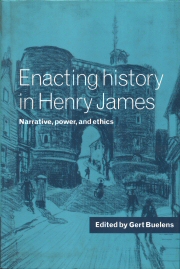Book contents
- Frontmatter
- Contents
- Notes on contributors
- Acknowledgments
- List of abbreviations
- Introduction
- 1 Power relations in the novels of James: the ‘liberal’ and the ‘radical’ version
- 2 Multiple germs, metaphorical systems, and moral fluctuation in The Ambassadors
- 3 James and the ethics of control: aspiring architects and their floating creatures
- 4 James and the shadow of the Roman Empire: manners and the consenting victim
- 5 ‘What Maisie knew’: Henry James's Bildungsroman of the artist as queer moralist
- 6 The double narrative of ‘The Beast in the Jungle’: ethical plot, ironical plot, and the play of power
- 7 Homoeroticism, identity, and agency in James's late tales
- 8 ‘A provision full of responsibilities’: senses of the past in Henry James's fourth phase
- 9 Possessing the American scene: race and vulgarity, seduction and judgment
- 10 History, narrative, and responsibility: speech acts in ‘The Aspern Papers’
- Index
2 - Multiple germs, metaphorical systems, and moral fluctuation in The Ambassadors
Published online by Cambridge University Press: 02 February 2010
- Frontmatter
- Contents
- Notes on contributors
- Acknowledgments
- List of abbreviations
- Introduction
- 1 Power relations in the novels of James: the ‘liberal’ and the ‘radical’ version
- 2 Multiple germs, metaphorical systems, and moral fluctuation in The Ambassadors
- 3 James and the ethics of control: aspiring architects and their floating creatures
- 4 James and the shadow of the Roman Empire: manners and the consenting victim
- 5 ‘What Maisie knew’: Henry James's Bildungsroman of the artist as queer moralist
- 6 The double narrative of ‘The Beast in the Jungle’: ethical plot, ironical plot, and the play of power
- 7 Homoeroticism, identity, and agency in James's late tales
- 8 ‘A provision full of responsibilities’: senses of the past in Henry James's fourth phase
- 9 Possessing the American scene: race and vulgarity, seduction and judgment
- 10 History, narrative, and responsibility: speech acts in ‘The Aspern Papers’
- Index
Summary
A remarkable feature of Henry James's great novel, The Ambassadors, is that its genesis and composition bespeak his unprecedented ‘ease’ and sense of assurance regarding its artistic merit, yet the novel's central ‘register’ of consciousness, Lambert Strether, the figure who carries all the weight of James's easeful composition and comprises the medium for James's artistic unity, is a character in opposition to those very elements suggested by his creation: burdened with regrets and ambiguity, ‘groping’ for interpretation, bewildered by his experiences, Strether morally fluctuates in his need ‘to be right’. An analogous contradiction is that Strether's ambassadorial power, delegated by Mrs Newsome, is systematically frittered away so that other ambassadors arrive to replace him, whereas James himself rejoices at his successful delegation of artistic consciousness to Strether, a favourite among his fictional ‘deputies’. To see whether this general feature of Ambassadors evokes any sense of difficulty or is merely an erroneous confusion between subject-matter and craftsmanship, it may help to re-enact the essential history of the book's composition and gradually inquire into Strether's predicament.
MULTIPLE GERMS
One of the better-known cases in American literature of a single generative incident which gave rise to a major novel is the famous ‘germ’ of The Ambassadors, when William Dean Howells stood in a Parisian garden owned by James McNeill Whistler sometime in 1894 and declared to his young thirty-year-old confrere, Jonathan Sturges, ‘Live. Live all you can: it's a mistake not to.’
- Type
- Chapter
- Information
- Enacting History in Henry JamesNarrative, Power, and Ethics, pp. 40 - 60Publisher: Cambridge University PressPrint publication year: 1997



